2018 FIFA World Cup Final
The 2018 FIFA World Cup Final was a football match that took place on 15 July 2018 to determine the winners of the 2018 FIFA World Cup. It was the final of the 21st FIFA World Cup, a quadrennial tournament contested by the men's national teams of the member associations of FIFA. The match was played by France and Croatia, and held at the Luzhniki Stadium in Moscow, Russia.
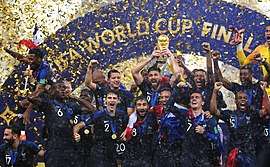 The France team holds the World Cup trophy | |||||||
| Event | 2018 FIFA World Cup | ||||||
|---|---|---|---|---|---|---|---|
| |||||||
| Date | 15 July 2018 | ||||||
| Venue | Luzhniki Stadium, Moscow | ||||||
| Man of the Match | Antoine Griezmann (France)[1] | ||||||
| Referee | Néstor Pitana (Argentina)[2] | ||||||
| Attendance | 78,011[3] | ||||||
| Weather | Partly cloudy 27 °C (81 °F) 51% humidity[4] | ||||||
Before 2018, France's only World Cup victory was in 1998 – though they had also reached the final in 2006 – while Croatia were playing in their first World Cup final.
France won the match 4–2, having taken a 2–1 lead during the first half on an own goal and penalty awarded by the video assistant referee (VAR), both firsts in a World Cup final. France became the second team in the 32-team World Cup to win all their knockout matches in regulation time, after Brazil in 2002. The final was the highest-scoring World Cup final since 1966,[5] and the highest-scoring 90-minute final since 1958.[6] The match was watched by a global audience of 1.12 billion people on television and streaming platforms.
Venue
The final was played at the Luzhniki Stadium in Moscow, located in the Khamovniki District of the Central Administrative Okrug. An expanded version of the stadium was named as the provisional final venue in Russia's World Cup bid, which was selected by FIFA on 2 December 2010.[7] Luzhniki Stadium was confirmed as the final venue on 14 December 2012, following a meeting of the now-erswthile FIFA Executive Committee held in Tokyo, Japan.[8] The stadium also hosted six other matches, including the opening match on 14 June, three group stage matches, a round of 16 match, and the second semi-final match.[9][10]
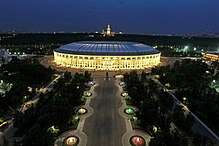
The Luzhniki Stadium, previously known as the Grand Arena of the Central Lenin Stadium until 1992, originally opened in 1956 as part of the Luzhniki Olympic Complex to host the USSR Summer Spartakiade.[11][12] The stadium has served as the national stadium of the country, hosting many matches for the Russia national team and its predecessor, the Soviet Union national team.[9][13] In the past, the stadium has been used as the home ground at various times for CSKA Moscow, Torpedo Moscow, and Spartak Moscow. However, there are currently no clubs based at the stadium.[13][14]
The stadium has hosted numerous international sporting events. The stadium was the main venue for the 1980 Summer Olympics, hosting the opening and closing ceremonies, athletics, football (four matches, including the gold medal match), and the Individual Jumping Grand Prix.[12][15] The stadium hosted the 1999 UEFA Cup Final, as well as the 2008 UEFA Champions League Final.[16] Other events staged include the Spartakiad, the final game of the 1957 Ice Hockey World Championships, the 1973 Summer Universiade, the Friendship Games in 1984, the 1986 Goodwill Games, and the 1998 World Youth Games.[17][18] In 2013, the Rugby World Cup Sevens and World Athletics Championships were held at the ground in front of sparse crowds.[19] The stadium has also served as a venue for many concerts, including Western artists after the fall of the Soviet Union,[15] as well as political rallies.[20]
Rated as a category 4 stadium by UEFA, the Luzhniki Stadium is the largest in Russia and at the 2018 World Cup; it usually has a maximum capacity of 81,006, but was reduced to 78,011 for the World Cup.[13][21] This also makes the stadium the largest in Eastern Europe,[22] and among the largest in Europe.[23][24] To prepare for the World Cup, the stadium was closed for extensive renovations in August 2013.[25] The spectator stands were moved closer to the pitch, which was converted from artificial turf to natural grass, after the removal of the athletic track. The historic facade of the stadium was preserved due to its architectural value, while the roof was upgraded using a new polycarbonate skin with exterior lighting.[26][27] The Luzhniki did not host any matches at the 2017 FIFA Confederations Cup due to the ongoing project.[28] The renovation project cost €341 million,[29] and the stadium officially reopened with an international friendly between Russia and Argentina on 11 November 2017.[30]
Background
After Uruguay and Brazil were eliminated in the quarter-finals, a European side was ensured to win the World Cup for a fourth consecutive tournament.[31] Colombia's earlier elimination had already guaranteed the match would feature at least one European team, as with every final since 1954. The match was also the ninth all-European World Cup final, which most recently occurred in 2006 and 2010.[32][33]
The match was the third World Cup final for France, first appearing in the 1998 final as hosts, winning 3–0 against reigning champions Brazil. France also contested the 2006 final, where they lost to Italy in a penalty shoot-out following a 1–1 draw.[34][35] Only Germany (eight) and Italy (six) have reached more finals among European nations.[36] Didier Deschamps became the fourth person to reach a World Cup final as both a player and as a manager, after Franz Beckenbauer, Rudi Völler, and Mário Zagallo.[37]
The match was the first World Cup final for Croatia in their fifth World Cup appearance. They are the 10th European country and 13th overall to reach a World Cup final, and the first new finalist since Spain in 2010.[38][39] With a population of 4.17 million, Croatia is the second least-populated country to play in a World Cup final, behind Uruguay (victors in 1930 and 1950).[40] Croatia's previous best performance was as World Cup debutants in 1998, when they finished in third place,[41] losing to France in the semi-finals before beating the Netherlands 2–1 in the third place play-off.[42][43]
The final was the sixth meeting between France and Croatia, with France undefeated in the previous fixtures with three wins and two draws.[44] The two sides first met in the aforementioned 1998 World Cup semi-final, with hosts France winning 2–1.[45] Their only other competitive meeting was during the group stage of Euro 2004, which finished as a 2–2 draw. Their next, and most recent, meeting was in a March 2011 friendly match, which finished as a 0–0 draw.[46]
Road to the final
| France | Round | Croatia | ||||||||||||||||||||||||||||||||||||||||||
|---|---|---|---|---|---|---|---|---|---|---|---|---|---|---|---|---|---|---|---|---|---|---|---|---|---|---|---|---|---|---|---|---|---|---|---|---|---|---|---|---|---|---|---|---|
| Opponents | Results | Group stage | Opponents | Results | ||||||||||||||||||||||||||||||||||||||||
| 2–1 | Match 1 | 2–0 | ||||||||||||||||||||||||||||||||||||||||||
| 1–0 | Match 2 | 3–0 | ||||||||||||||||||||||||||||||||||||||||||
| 0–0 | Match 3 | 2–1 | ||||||||||||||||||||||||||||||||||||||||||
Group C winners
Source: FIFA |
Final standings | Group D winners
Source: FIFA | ||||||||||||||||||||||||||||||||||||||||||
| Opponents | Results | Knockout stage | Opponents | Results | ||||||||||||||||||||||||||||||||||||||||
| 4–3 | Round of 16 | 1–1 (a.e.t.) (3–2 p) | ||||||||||||||||||||||||||||||||||||||||||
| 2–0 | Quarter-finals | 2–2 (a.e.t.) (4–3 p) | ||||||||||||||||||||||||||||||||||||||||||
| 1–0 | Semi-finals | 2–1 (a.e.t.) | ||||||||||||||||||||||||||||||||||||||||||
France
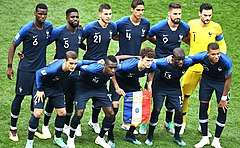
France entered the 2018 World Cup as one of the favourites to win the tournament, particularly for their strong squad featuring several youth talents.[47] The team finished as runners-up to Portugal at Euro 2016, which the country hosted.[47] The team qualified for the World Cup finals after finishing first in their qualification group, ahead of Sweden and the Netherlands.[47]
At the World Cup, France were drawn into Group C alongside Australia, Denmark, and Peru. The team defeated Australia 2–1 in its opening match in Kazan, with a penalty called by the video assistant referee and scored by Antoine Griezmann followed by an own goal deflected by Australian defender Aziz Behich.[48] In its second match, France won 1–0 over Peru on a goal scored by 19-year-old Kylian Mbappé, who became France's youngest goalscorer at a major tournament.[49][50] The victory over Peru qualified France for the knockout stage, allowing manager Didier Deschamps to rest several starting players for the final group stage match against Denmark. The match at the Luzhniki Stadium in Moscow finished in a scoreless draw marked by misplaced passes and goalkeeping mistakes.[51] The team's group stage performance was characterised as lacking cohesion and failing to use its star players effectively.[52]
Finishing as winners of Group C, France were matched in the round of 16 with Group D runners-up Argentina. France won 4–3 on two goals scored by Mbappé, who also won a penalty in the opening minutes.[53] Defender Benjamin Pavard also scored in the match, with his strike later voted as goal of the tournament.[54] Mbappé's performance drew comparisons to Brazilian stars Ronaldo and Pelé, who in 1958 was the most recent teenager to score twice in a World Cup match.[55][56] In the quarter-finals, France defeated Uruguay 2–0 on a goal and assist by Griezmann.[57] The team advanced to a semi-final match against Belgium in St. Petersburg, which ended in a 1–0 win for the French with a corner kick headed into the goal by defender Samuel Umtiti.[58] The French team, particularly Mbappé, were criticised for timewasting and other unsportsmanlike conduct in the semi-finals after taking the lead in the second half.[59]
Croatia

Croatia entered the 2018 World Cup as dark horses, with their golden generation led by forward Mario Mandžukić and midfielders Marcelo Brozović, Mateo Kovačić, Luka Modrić, Ivan Perišić, and Ivan Rakitić.[60][61] The team had been eliminated in the group stage at the 2014 tournament,[62] but reached the round of 16 at Euro 2016.[63] In their qualification group, Croatia scored 15 goals and finished second to Iceland after appointing manager Zlatko Dalić amid a series of poor away results.[64][65] However, Croatia managed to advance past Greece in the qualifying play-offs, winning the first leg 4–1 and drawing 0–0 in the second.[66]
Croatia were drawn into Group D with Argentina, Iceland, and Nigeria, considered a difficult draw due to Argentina's talent and Nigeria's historic performances.[64][67] In their opening match, the team earned a 2–0 victory over Nigeria, with an own goal by Oghenekaro Etebo caused by Mandžukić and a penalty scored by Modrić.[68] Striker Nikola Kalinić refused to enter the match as a substitute, citing back pain as his reason for not playing, and was expelled from the team by Dalić, leaving Croatia with only 22 players for the remainder of the tournament.[69] Croatia went on to upset Argentina with a 3–0 win, thanks to an effective game plan that used the "height and strength of their players to dominate the game in aerial duels", playing a "pressing game, counter-attacking, and more direct play in possession" to counter Lionel Messi, scoring all their goals in the second half.[70] Croatia finished atop the group with a 2–1 win over Iceland, resting several starting players in the final group match.[71][72][73]
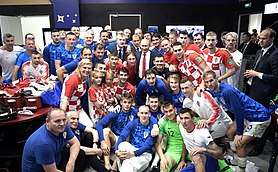
In the round of 16, Croatia played Denmark and earned a 1–1 draw after the two teams exchanged goals in the opening five minutes and a missed penalty from Modrić in extra time. Croatia won the subsequent penalty shootout 3–2, with three saves by goalkeeper Danijel Subašić and two saves by Danish goalkeeper Kasper Schmeichel.[74][75] The team advanced to a quarter-final fixture with hosts Russia, who had defeated Spain in the round of 16, in Sochi. The Russians scored their first in the 31st minute, but Andrej Kramarić equalised for Croatia eight minutes later and kept the score at 1–1 through the end of regular time. Croatia took a 2–1 lead in the 101st minute with a header by Domagoj Vida, but Russian defender Mário Fernandes equalised five minutes before the end of extra time to trigger a penalty shootout. The shootout was won 4–3 by Croatia after two misses by Russia and a shot by Modrić that rebounded into the goal off Akinfeev's arm and the post.[76][77] Croatia became the second team in World Cup to win two shootouts in a tournament, after Argentina in 1990.[78] After the match, a video of Vida shouting "Glory to Ukraine" prompted controversy among Russians and a warning from FIFA's disciplinary committee, which enforces a ban on political slogans.[79] Croatia's semi-final match against England at the Luzhniki began as they conceded a free kick goal by English defender Kieran Trippier in the fifth minute. Croatia resisted several attempts by England to score a second goal in the first half. Croatia managed an equalising goal of their own through a shot by Perišić in the 68th minute. The match was won 2–1 by Croatia after a 109th-minute goal by Mandžukić. This made Croatia the first team to earn three come-from-behind victories in the FIFA World Cup, all three matches also going into extra time.[80][81]
Pre-match
Match ball
The official match ball for the final was the Telstar Mechta (Russian: Мечта; transl. dream or ambition), a red-coloured variant of the Adidas Telstar 18 introduced for the knockout stage.[82][83] The Telstar family, a homage to the original 1970 Telstar, was designed similarly to 2014's Brazuca, but with longer seams and additional panels.[84]
Officials
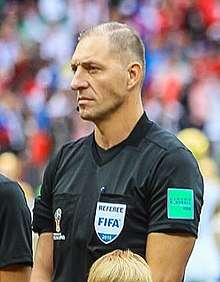
Argentine referee Néstor Pitana was selected to lead the officiating team for the final, which was announced on 12 July 2018 by the FIFA Referees Committee. The final was Pitana's fifth match as referee during the tournament, becoming only the second referee to officiate the opening match and the final.[85] Pitana officiated an additional group stage match, along with two knockout stage matches in the round of 16 and quarter-finals. Pitana has been a FIFA referee since 2010, and officiated four matches at the 2014 FIFA World Cup. His compatriots Hernán Maidana and Juan Pablo Belatti were chosen as assistant referees. Björn Kuipers of the Netherlands was chosen as the fourth official, with his fellow countryman Erwin Zeinstra as the reserve assistant.[2] Italian Massimiliano Irrati was named the video assistant referee, presiding over the first use of the technology at a World Cup final. Argentine Mauro Vigliano was chosen as the assistant video assistant referee, while Carlos Astroza of Chile was appointed as the second assistant and Danny Makkelie of the Netherlands as the third assistant.[86]
Closing ceremony
The tournament's closing ceremony was held prior to the start of the match, featuring a performance of "Live It Up", the official song of the tournament, by Will Smith, Nicky Jam, and Era Istrefi. Jam also performed "X (Equis)", wearing a shirt honouring J Balvin.[87] Opera singer Aida Garifullina sang the Russian folk song "Kalinka", accompanied by a children's choir and percussion section that featured a cameo by Brazilian star Ronaldinho.[88]
Match
Summary
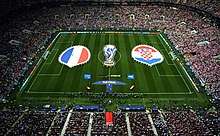
Croatia kicked off the final at 18:00 local time (15:00 UTC), with the ground temperature reported at 27 °C (81 °F). The match was played through a minor thunderstorm, which produced several visible lightning strikes.[89] An audience of 78,011 spectators at the Luzhniki Stadium watched the match, including ten heads of state, among them Russian president Vladimir Putin, French president Emmanuel Macron, and Croatian president Kolinda Grabar-Kitarović.[90] The starting line-ups for both teams were identical to those fielded in the semi-finals.[91]
.jpg)
Croatia had the majority of possession and chances early in the first half, with the ball staying mostly in France's half.[5][92] An attack by French midfielder Antoine Griezmann was stopped by a challenge from Marcelo Brozović, which was called as a foul despite claims that Griezmann dived.[93][94][95] Griezmann took the ensuing 30-yard (27 m) free kick, which was diverted by the head of Mario Mandžukić into the left corner of his own net to give France the lead in the 18th minute.[96] It was the first own goal to be scored in a World Cup final and the 12th of the tournament, the most of any World Cup.[97]
Ten minutes later, Croatia equalised with a left-footed strike by Ivan Perišić to the right corner of the net, assisted by Domagoj Vida after a free kick by Luka Modrić on the right. In the 34th minute, a penalty was awarded against Croatia after Perišić's handball in the box from a corner on the right was reviewed by the video assistant referee.[96] Griezmann scored the penalty in the 38th minute with a low finish to the left, giving France a 2–1 lead at half-time; the first half's three goals were the most of any World Cup final since 1974.[6] France led at half-time despite having only one shot on goal and with only 34% of possession.[97]
A Croatian counter-attack was stopped early in the second half after several pitch invaders were chased onto the field by security officers; Russian feminist rock band and protest group Pussy Riot claimed responsibility for the interruption.[98] In the 59th minute, France extended their lead to 3–1 with a left-foot strike to the left of the net from the edge of the penalty area by Paul Pogba after his initial shot had been blocked. Six minutes later, Kylian Mbappé scored France's fourth goal, with a low right-foot shot from outside the box to the left of the net; Mbappé became the first teenager to score in a World Cup final since Pelé in 1958.[92] Croatia scored their second goal in the 69th minute from a back-pass that goalkeeper Hugo Lloris failed to dribble away from Mandžukić, who poked the loose ball into the unguarded net with his right leg. Despite a late push by Croatia, the match finished as a 4–2 victory for France.
Details
France[99]
|
Croatia[99]
|
|
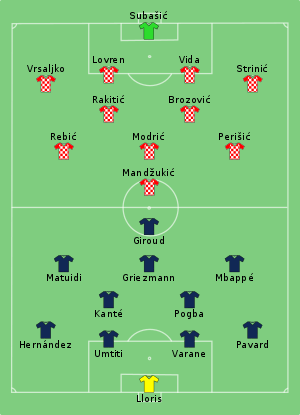 |
| |||||||||||||||||||||||||||||||||||||||||||||||||||||||||||||||||||||||||||||||||||||||||||||||||||||||||||||||||||||||||||||
|
Man of the Match:
Assistant referees:[99]
|
Match rules[100]
|
Statistics
|
|
|
Post-match
.jpg)
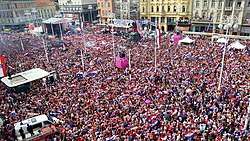
France became the sixth country to win the World Cup more than once with their win.[102] Didier Deschamps became the third person to have won the World Cup as both a player and manager, after Mário Zagallo and Franz Beckenbauer.[37] The final was the highest scoring since 1966, and the highest score in regular time since 1958.[90][6] The medals were presented on the pitch to both teams by presidents Putin, Macron, and Grabar-Kitarović amid a heavy rainstorm.[103] FIFA president Gianni Infantino handed the trophy to French captain Hugo Lloris.[104] As Lloris raised the trophy, a short version of the tournament's official song "Live It Up" was played.[105]
Croatian captain Luka Modrić won the Golden Ball as best player of the tournament.[106] France's Antoine Griezmann, the final's man of the match,[107] also won the Bronze Ball and the Silver Boot award with four goals and two assists. Kylian Mbappé won the Best Young Player award for the tournament.[108]
Large crowds, including 90,000 people at the Eiffel Tower fanzone and an estimated million on the Champs-Élysées, celebrated the victory in Paris.[109][110] The celebrations were marred by instances of rioting that were broken up by police, as well as the deaths of at least two people during celebrations elsewhere in the country, one man died after diving into a shallow canal and another died after crashing his car into a tree,[111][112] RATP, the operator of the Paris Métro system, temporarily renamed several stations in honour of the team and its World Cup victory.[113]
On 16 July, more than 550,000 fans welcomed the Croatian team home in the capital city of Zagreb, in the single largest public gathering in Croatia's history, where a six-hour-long bus tour brought them from Zagreb Airport to Ban Jelačić Square.[114] In the following days, players were all welcomed individually in their hometowns as well.[115]
Broadcasting and viewership
FIFA estimated that the global audience for the final peaked at 1.12 billion people, including 884 million watching television broadcasts and 232 million using other platforms, including online streaming, and at public venues.[116] According to a broadcast audit report, 86.7 percent of televisions in France and 88.6 in Croatia were watching the broadcast.[117]
Europe
In France, the final was televised on TF1 and BeIN Sports and drew an average of 26.1 million viewers, making it the most watched event ever in French television history.[118] In the United Kingdom, the final had an average viewership of 10.5 million and a peak viewership of 13.8 million, split between free-to-air broadcasters BBC One and ITV, almost half that of the viewership of England–Croatia semi-final.[119][120][121] In Germany, the match drew a viewership of 21.3 million, which was around 76% of the market share, on state-owned ZDF.[120][121][122] In Spain, the match had a 57.3% share, with 8.2 million viewers on Mediaset España Comunicación's Telecinco.[120] In Croatia, the match drew around 1.538 million viewers – more than 38% of the population – on national broadcaster HTV2 for an 89.3% market share.[121][122][123] In Italy, it drew 11.7 million viewers on Canale 5.[120][122] In the Netherlands, the match had a viewership of 3.1 million on NPO1.[122] In the host nation of Russia, the final was the third-most watched match of the 2018 World Cup and accounted for around 50% of the nation's population.[124]
In total, the final drew more than 160 million viewers in 20 European territories, including Russia, the United Kingdom and Germany.[125][126]
Rest of the world
In the United States, the match was broadcast in English on Fox and in Spanish on Telemundo; the broadcasts averaged 16.6 million viewers combined, with Telemundo reaching a total of 57% of the country's Latino population.[127][128][129][130] In India, 70 million viewers streamed the match online, through Sony Picture Networks India's (SPN) Sony Liv application, which was a record for a football match;[131][132][133] an additional 22.4 million viewers watched the match on Sony Ten 2, Sony Ten 3 and Sony ESPN.[131] In China, the match drew a combined of 56 million viewers on state-broadcasters CCTV-1 and CCTV-5, the most-watched sporting event in China since 2008 Beijing Olympics;[127][125][126] an additional 24 million viewers streamed the match through Youku, a video-service and an Alibaba Group subsidiary.[134][135] In Australia, the final was watched by an average of 2.2 million viewers – with a peak of 3.4 million viewers – on national public broadcaster SBS.[136][137] Whereas, in Canada, the final was watched by an average of 3.9 million viewers, with a peak of 5.4 million viewers on CTV, TSN and RDS.[138]
Advertising
In the United States, Fox received between US$399,000 and $750,000 for a 30-second advertisement spot during the World Cup final;[139][140][141] whereas in France, TF1 got up to $300,000 for a 30-second ad-spot.[127]
See also
References
- "France v Croatia – Man of the Match". FIFA.com. Fédération Internationale de Football Association. 15 July 2018. Retrieved 15 July 2018.
- "Nestor Pitana to referee World Cup Final". FIFA.com. Fédération Internationale de Football Association. 12 July 2018. Retrieved 12 July 2018.
- "Match report – Final – France v Croatia" (PDF). FIFA.com. Fédération Internationale de Football Association. 15 July 2018. Retrieved 15 July 2018.
- "Start list – Final – France v Croatia" (PDF). FIFA.com. Fédération Internationale de Football Association. 15 July 2018. Retrieved 15 July 2018.
- Glendenning, Barry (15 July 2018). "World Cup 2018 final: France v Croatia – live!". The Guardian. Retrieved 15 July 2018.
- "France lift second World Cup after winning classic final 4–2". Reuters. 15 July 2018. Retrieved 15 July 2018.
- Clegg, Jonathan; White, Gregory L. (2 December 2010). "Russia to Host 2018 World Cup; Qatar Gets 2022". The Wall Street Journal. Retrieved 10 July 2018.
- "Russia 2018 to start and finish at Luzhniki Stadium". FIFA.com. Fédération Internationale de Football Association. 15 December 2012. Retrieved 17 November 2017.
- "Luzhniki Stadium: All you need to know". FIFA.com. Fédération Internationale de Football Association. 26 January 2016. Retrieved 10 July 2018.
- "FIFA World Cup Russia 2018 – Match Schedule" (PDF). FIFA.com. Fédération Internationale de Football Association. Retrieved 20 December 2017.
- "Putin's goal is to showcase Russia at 2018 World Cup". Reuters. 14 July 2014. Retrieved 10 July 2018.
- Moscow Fiscultura i Sport (1981). Games of the XXII Olympiad: Official Report of the Organising Committee, Volume 2 (Report). International Olympic Committee. pp. 46–51. Retrieved 10 July 2018 – via Olympics World Library.
- "Luzhniki Stadium". FIFA.com. Fédération Internationale de Football Association. Retrieved 17 November 2017.
- "Moscow". FIFA.com. Fédération Internationale de Football Association. Retrieved 17 November 2017.
- "Meat to Mötley Crüe: the theatre of English dreams". The Guardian. 19 May 2008. Retrieved 10 July 2018.
- Halpin, Tony (22 May 2008). "Moscow proud of trouble free Champions League final". The Times. London. Retrieved 10 July 2018.
- "Moscow's 2018 World Cup final venue to be ready by December 2016". RT. 1 January 2016. Retrieved 10 July 2018.
- "Sport city: Luzhniki yesterday, today and tomorrow". Government of Moscow. 1 November 2016. Retrieved 10 July 2018.
- Wildey, Alison (12 August 2013). "Athletes left staring into empty space at Luzhniki". Reuters. Retrieved 10 July 2018.
- Bennetts, Marc (4 March 2018). "Russians forced to attend Putin's star-studded election rally". The Guardian. Retrieved 10 July 2018.
- "Russia 2018 World Cup stadium venues: 12 grounds across 11 cities". ESPN.com. ESPN Internet Ventures. Press Association. 1 December 2017. Retrieved 10 July 2018.
- Tighe, Sam (18 December 2014). "Top 100 Stadiums in World Football". Bleacher Report. Retrieved 11 July 2018.
- "Luzhniki: About the stadium". RT.com. Retrieved 20 July 2018.
- "Luzhniki Stadium – Russia World Cup Venue 2018". ArchExplore. 3 June 2018. Archived from the original on 11 July 2018. Retrieved 11 July 2018.
- "Luzhniki Stadium for major renovation after World Champs". The Jamaica Observer. Agence France-Presse. 5 August 2013. Retrieved 10 July 2018.
- "Experts name Luzhniki Stadium in Moscow as 2017 world's best football arena". TASS. 7 March 2018. Retrieved 10 July 2018.
- "Luzhniki Stadium almost finished". Government of Moscow. 31 March 2017. Retrieved 10 July 2018.
- "Russian stadiums readying to host Confederations Cup". USA Today. Associated Press. 12 June 2017. Retrieved 10 July 2018.
- "Luzhniki Stadium's renovation completed". Dawn. Agence France-Presse. 31 August 2017. Retrieved 10 July 2018.
- "Argentina beats Russia 1–0 in friendly at renovated Luzhniki Stadium". EFE. 11 November 2017. Retrieved 10 July 2018.
- Dunbar, Graham (6 July 2018). "Europe assured of extending World Cup winning streak to 4". The Washington Post. Associated Press. Retrieved 10 July 2018.
- "Magic moments in all-European Finals". FIFA.com. Fédération Internationale de Football Association. 12 July 2018. Retrieved 14 July 2018.
- Stokkermans, Karel (5 July 2018). "World Cup 1930–2018". rsssf.com. Rec.Sport.Soccer Statistics Foundation. Retrieved 10 July 2018.
- Douglas, Steve (10 July 2018). "Vive la France: Les Bleus advance to World Cup final". The Washington Post. Associated Press. Retrieved 10 July 2018.
- Reineking, Jim (25 May 2018). "Every FIFA World Cup champion: Brazil, Germany, Italy historically dominate tournament". USA Today. Retrieved 10 July 2018.
- Hafez, Shamoon (10 July 2018). "France 1 Belgium 0". BBC Sport. Retrieved 10 July 2018.
- Sen, Debayan (10 July 2018). "By the numbers – Can Deschamps join Zagallo and Beckenbauer?". ESPN.com. ESPN Internet Ventures. Retrieved 12 July 2018.
- "Stats of the day – 12 July 2018" (PDF). FIFA.com. Fédération Internationale de Football Association. 12 July 2018. p. 1. Retrieved 12 July 2018.
- Phillips, Mitch (11 July 2018). "Mandzukic sends irrepressible Croatia into first World Cup final". Reuters. Retrieved 12 July 2018.
- "World Cup final 2018: France v Croatia – your guide to Sunday's match". BBC Sport. 14 July 2018. Retrieved 15 July 2018.
- "Preview: France v Croatia". FIFA.com. Fédération Internationale de Football Association. 14 July 2018. Retrieved 14 July 2018.
- McAleavy, Emma L. (11 July 2018). "Croatia's 2018 World Cup Pursuit Inspired by the Past". The New York Times. Retrieved 11 July 2018.
- "Croatia at the 1998 World Cup – a look back at their last semi-final run". The Irish Independent. Press Association. 10 July 2018. Retrieved 11 July 2018.
- West, Jenna (11 July 2018). "France vs. Croatia History: All-Time Head-to-Head Results". Sports Illustrated. Retrieved 11 July 2018.
- "The last time France and Croatia met on the world stage". FIFA.com. Fédération Internationale de Football Association. 14 July 2018. Retrieved 14 July 2018.
- "Statistical Kit for the FIFA World Cup" (PDF). FIFA.com. Fédération Internationale de Football Association. 12 July 2018. p. 13. Retrieved 12 July 2018.
- "Loaded, Deep France Enters World Cup as One of Favorites to Win it All". Sports Illustrated. 1 June 2018. Retrieved 10 July 2018.
- Sutcliffe, Steve (18 June 2018). "France 2–1 Australia". BBC Sport. Retrieved 10 July 2018.
- Clarey, Cristopher (21 June 2018). "36 Years and No World Cup Goals: Peru Eliminated by France". The New York Times. Retrieved 10 July 2018.
- Lawrence, Amy (21 June 2018). "France seal last-16 spot as Kylian Mbappé earns victory over Peru". The Guardian. Retrieved 10 July 2018.
- Dunbar, Graham (26 June 2018). "Denmark advances at World Cup in drab 0–0 draw with France". Chicago Tribune. Associated Press. Retrieved 10 July 2018.
- White, Adam (22 June 2018). "France under Deschamps look a lot like England under Eriksson". The Guardian. Retrieved 10 July 2018.
- Wilson, Jonathan (30 June 2018). "Kylian Mbappé doubles up in France's rollercoaster victory over Argentina". The Guardian. Retrieved 10 July 2018.
- "Pavard's stunner voted Hyundai Goal of the Tournament". FIFA. 25 July 2018. Retrieved 25 July 2018.
- "King Kylian! Is France superstar Mbappe the heir to the Brazilian Ronaldo's throne?". Goal.com. 6 July 2018. Retrieved 12 July 2018.
- "Mbappe on Pele comparison: 'flattering, but he's in another category'". Chicago Tribune. Agence France-Presse. 30 June 2018. Retrieved 10 July 2018.
- Bevan, Chris (6 July 2018). "Uruguay 0–2 France". BBC Sport. Retrieved 10 July 2018.
- Taylor, Daniel (10 July 2018). "Samuel Umtiti header puts France in World Cup final with win over Belgium". The Guardian. Retrieved 10 July 2018.
- Das, Andrew (10 July 2018). "France Rides to World Cup Final on Defense's Back". The New York Times. Retrieved 10 July 2018.
- Yokhin, Michael (26 May 2018). "Croatia quartet of star midfielders provides hope of escaping group". ESPN.com. ESPN Internet Ventures. Retrieved 11 July 2018.
- Janieck, Karel (27 May 2018). "World Cup Countdown: Talented Croatia arrives with unfulfilled potential". Chicago Tribune. Associated Press. Retrieved 11 July 2018.
- "Croatia 1–3 Mexico". BBC Sport. 23 June 2014. Retrieved 13 July 2018.
- Holiga, Aleksandar (6 July 2018). "Croatia's World Cup run divides nation where football is never just sport". The Guardian. Retrieved 11 July 2018.
- "Modric, Rakitic Key Croatia's Star-Laden Squad in Difficult World Cup Group". Sports Illustrated. 2 June 2018. Retrieved 11 July 2018.
- Clegg, Jonathan (6 July 2018). "Croatia: The World Cup's Russian Nesting Dolls". The Wall Street Journal. Retrieved 11 July 2018.
- "Croatia secure World Cup 2018 place with victory over Greece". BBC Sport. 12 November 2017. Retrieved 11 July 2018.
- "Croatia out to match success of 1998 World Cup generation". Reuters. 22 May 2018. Retrieved 11 July 2018.
- Bogage, Jacob (16 June 2018). "Croatia vs. Nigeria 2018 World Cup: Modric's penalty kick seals 2–0 Croatia victory". The Washington Post. Retrieved 11 July 2018.
- MacInnes, Paul (18 June 2018). "Croatia send reluctant substitute Nikola Kalinic home from World Cup". The Guardian. Retrieved 15 July 2018.
- Osmanbasic, Adin (23 June 2018). "How did Croatia beat Argentina 3:0?". Spielverlagerung. Retrieved 20 July 2018.
- Jennings, Patrick (21 June 2018). "Argentina 0–3 Croatia". BBC Sport. Retrieved 11 July 2018.
- Mather, Victor (26 June 2018). "Croatia Crushes Iceland's World Cup Dream". The New York Times. Retrieved 11 July 2018.
- "Croatia take Group D with 2–1 win against Iceland". EFE. 27 June 2018. Retrieved 12 July 2018.
- Wilson, Jeremy; Eccleshare, Charlie (2 July 2018). "Croatia through to World Cup quarter-finals after dramatic penalty shoot-out victory over Denmark". The Daily Telegraph. Retrieved 11 July 2018.
- "Subasic the hero as Croatia claim shootout win". FIFA.com. Fédération Internationale de Football Association. 2 July 2018. Retrieved 11 July 2018.
- Rogers, Martin (7 July 2018). "Russia's underdog World Cup run comes to an end with PK loss to Croatia". USA Today. Retrieved 11 July 2018.
- Hytner, David (7 July 2018). "Croatia book World Cup semi-final with England after penalty shootout win". The Guardian. Retrieved 11 July 2018.
- Debayan (7 July 2018). "By the numbers: Back-to-back shootout wins for Croatia, record penalty saves for Subasic". ESPN.com. ESPN Internet Ventures. Retrieved 11 July 2018.
- Petrosyan, Artur (8 July 2018). "Croatia defender Domagoj Vida warned by FIFA over pro-Ukraine comments". ESPN.com. ESPN Internet Ventures. Retrieved 11 July 2018.
- Das, Andrew; Mather, Victor (11 July 2018). "Croatia Turns England's World Cup Destiny Into Despair". The New York Times. Retrieved 11 July 2018.
- Rogers, Martin (11 July 2018). "Croatia tops England in extra time to reach World Cup final". USA Today. Retrieved 11 July 2018.
- Wright, Chris (26 June 2018). "World Cup 2018 match ball released – yep, that's right, another one". ESPN. Retrieved 14 July 2018.
- "adidas Football Reveals Official Match Ball for the Knockout Stage of the 2018 FIFA World Cup Russia". FIFA.com (Press release). Fédération Internationale de Football Association. 26 June 2018. Retrieved 14 July 2018.
- Sabin, Dyani (18 June 2018). "How the new World Cup ball was designed to not influence the games". Popular Science. Retrieved 14 July 2018.
- "Pitana: It's an indescribable feeling". FIFA.com. Fédération Internationale de Football Association. 13 July 2018. Retrieved 14 July 2018.
- Gantman, Marcelo (12 July 2018). "Los atributos que le vio la FIFA a Néstor Pitana para designarlo para la final del Mundial Rusia 2018: "la roca" que marcó el estilo arbitral" [The attributes that saw FIFA designate Néstor Pitana for the 2018 World Cup Final: "the rock" that marked the refereeing style]. La Nación (in Spanish). Retrieved 12 July 2018.
- "Will Smith, Nicky Jam y Era Istrefi calientan la final" [Will Smith, Nicky Jam and Era Istrefi warm up the final]. La Jornada (in Spanish). Notimex. 15 July 2018. Retrieved 15 July 2018.
- "Hollywood star Will Smith brings down curtain on Russia World Cup". Reuters. 15 July 2018. Retrieved 15 July 2018.
- Das, Andrew; Mather, Victor (15 July 2018). "France vs. Croatia: World Cup Final Live Updates". The New York Times. Retrieved 15 July 2018.
- Goff, Steven; Fortier, Sam; Wilson, Scott (15 July 2018). "France blazes past Croatia to win World Cup title for the second time". The Washington Post. Retrieved 15 July 2018.
- Austin, Jack (15 July 2018). "World Cup final: France and Croatia name unchanged line-ups as Kylian Mbappe starts". The Independent. Retrieved 15 July 2018.
- Ogden, Mark (15 July 2018). "Mbappe powers France to World Cup glory, Croatia reeling after VAR controversy". ESPN. Retrieved 15 July 2018.
- Potts, Michael. "Antoine Griezmann: Did France star dive vs Croatia in World Cup final?". The Daily Express. Retrieved 15 July 2018.
- Doré, Louis. "Griezmann dive and Perisic penalty: Two big decisions go against Croatia in World Cup final". i. Retrieved 16 July 2018.
- "Griezmann dive fools Pitana and leads to opening goal for France". Diario AS. Retrieved 16 July 2018.
- Taylor, Daniel (15 July 2018). "France seal second World Cup triumph with 4–2 win over brave Croatia". The Guardian. Retrieved 15 July 2018.
- Bull, JJ (15 July 2018). "World Cup final 2018, France vs Croatia: live score and latest updates". The Daily Telegraph. Retrieved 15 July 2018.
- "Pussy Riot claim responsibility for World Cup Final pitch invasion". Evening Standard. 15 July 2018. Retrieved 16 July 2018.
- "Tactical Line-up – Final – France v Croatia" (PDF). FIFA.com. Fédération Internationale de Football Association. 15 July 2018. Retrieved 15 July 2018.
- "Regulations – 2018 FIFA World Cup Russia" (PDF). FIFA.com. Fédération Internationale de Football Association. Retrieved 16 November 2017.
- "Match report: Half-time – Final – France v Croatia" (PDF). FIFA.com. Fédération Internationale de Football Association. 15 July 2018. Retrieved 15 July 2018.
- Prince-Wright, Joe (15 July 2018). "France win World Cup after classic final". NBC Sports. Retrieved 15 July 2018.
- "Soaked but smiling, Croatian president wins admirers at World Cup final". Reuters. 16 July 2018. Retrieved 16 July 2018.
- "Young, Joyful France Beats Croatia 4–2 to Win 2nd World Cup". USA Today. Associated Press. 15 July 2018. Retrieved 27 July 2018.
- #WorldCupAtHome | France v Croatia (Russia 2018) (YouTube video). Fédération Internationale de Football Association. 17 May 2020.
- "Golden consolation for magical Modric". FIFA.com. Fédération Internationale de Football Association. 15 July 2018. Retrieved 16 July 2018.
- "Formidable France secure second title". FIFA.com. Fédération Internationale de Football Association. 15 July 2018. Retrieved 15 July 2018.
- "Luka Modric wins World Cup Golden Ball; Mbappe and Courtois also honoured". ESPN. 15 July 2018. Retrieved 15 July 2018.
- Felix, Bate (15 July 2018). "Paris fanzone fills with 90,000 willing 'Les Bleus' to World Cup victory". Reuters. Retrieved 15 July 2018.
- Chrisafis, Angelique (15 July 2018). "Paris celebrates World Cup win as one million fans fill Champs-Élysées". The Guardian. Retrieved 15 July 2018.
- Samuel, Henry; Chandler-Wilde, Helen (16 July 2018). "Two dead amid World Cup final victory celebrations in France". The Telegraph. Retrieved 16 July 2018.
- "Paris police arrest 102 people after World Cup celebrations turn violent". ESPN. 16 July 2018. Retrieved 16 July 2018.
- "World Cup: Paris renames stations for France heroes' welcome". BBC Sport. 16 July 2018. Retrieved 16 July 2018.
- Ilic, Igor (16 July 2018). "Croatia takes to streets to toast soccer team's historic run". Reuters. Retrieved 16 July 2018.
- "HRVATSKA JE OPET GORJELA: Spektakularni dočeci diljem zemlje; Vatrene pozdravili Split, Zadar, Varaždin, Donji Miholjac, Karlovac…" [CROATIA WAS ON FIRE AGAIN: Spectacular receptions all across the country; Vatreni were welcomed in Split, Zadar, Varaždin, Donji Miholjac, Karlovac...]. net.hr (in Croatian). 17 July 2018. Retrieved 1 February 2020.
- "More than half the world watched record-breaking 2018 World Cup". FIFA.com. Fédération Internationale de Football Association. 21 December 2018. Retrieved 21 December 2018.
- "2018 FIFA World Cup Russia: Global broadcast and audience summary" (PDF). Fédération Internationale de Football Association. 21 December 2018. Retrieved 21 December 2018.
- "26,1 millions de télespectateurs au total devant la finale de la Coupe du Monde". L’Équipe. 25 July 2018. Retrieved 25 July 2018.
- White, Peter; Tartaglione, Nancy (16 July 2018). "World Cup Final Scores 22.3M Peak In France As TF1 Secures Best Ratings Since 2016". Deadline Hollywood. Penske Media Corporation. Retrieved 19 July 2018.
- Keslassy, Elsa (18 July 2018). "Global Broadcasters Score Big With Live World Cup Final Ratings". Variety. Leo Barraclough, Stewart Clarke, John Hopewell, Vivarelli and Joseph Otterson. London, Madrid, Rome, Los Angeles: Michelle Sobrino-Stearns. ISSN 0042-2738. OCLC 810134503. Retrieved 19 July 2018.
- Doherty, Christian (17 July 2018). "Eurodata: World Cup Final reached 163 m viewers in Europe". Digital TV Europe. Retrieved 20 July 2018.
- Briel, Robert (16 July 2018). "World Cup Final attracted 163 m viewers in 20 territories". Broadband TV News. London. Retrieved 20 July 2018.
- "More Croats watched World Cup semi with England than historic first-ever final – FIFA". RT International. 18 July 2018. Retrieved 19 July 2018.
- "World Cup Final third most popular match among Russian viewers". FourFourTwo Australia. Sputnik News. 18 July 2018. Retrieved 20 July 2018.
- Briel, Robert (16 July 2018). "World Cup Final attracted 163m viewers in 20 territories". Broadband TV News. London. Retrieved 20 July 2018.
- Doherty, Christian (17 July 2018). "Eurodata: World Cup Final reached 163m viewers in Europe". Digital TV Europe. Retrieved 20 July 2018.
- Keslassy, Elsa (18 July 2018). "Global Broadcasters Score Big With Live World Cup Final Ratings". Variety. Leo Barraclough, Stewart Clarke, John Hopewell, Vivarelli and Joseph Otterson. London, Madrid, Rome, Los Angeles: Michelle Sobrino-Stearns. ISSN 0042-2738. OCLC 810134503. Retrieved 19 July 2018.
- Nicolaou, Anna (17 July 2018). "World Cup final ratings flop for Fox". Financial Times. New York City. ISSN 0307-1766. Retrieved 20 July 2018.
- O'Connell, Michael (16 July 2018). "TV Ratings: World Cup Final Drops 32 Percent From 2014, Posts Fox Best". The Hollywood Reporter. Lynne Segall. ISSN 0018-3660. Retrieved 20 July 2018.
- Harris, Christopher (17 July 2018). "World Cup Final delivers 17 million viewers across FOX and Telemundo combined". World Soccer Talk. Retrieved 20 July 2018.
- Basu, Rith (16 July 2018). "World Cup over but surfeit of sport to beat hangover". The Telegraph. Kolkata. OCLC 271717941. Retrieved 20 July 2018.
- Laghate, Gaurav (18 July 2018). "Record 70 million viewers watched FIFA World Cup on SonyLIV". The Economic Times. Mumbai: The Times Group. OCLC 61311680. Retrieved 20 July 2018.
- Bhaskar, Rohith (18 July 2018). "SonyLiv's stream of the FIFA world cup shows that soccer is gaining on cricket in popularity". PCMag India. ISSN 2373-2830. OCLC 34196174. Retrieved 22 July 2018.
- Tao, Li (18 July 2018). "Online streamers score after a surge in Chinese viewers during the 2018 World Cup football tournament". South China Morning Post. Retrieved 24 July 2018.
- Yining, Ding (20 July 2018). "Suning Sports raises US$600m". SHINE. Shanghai Daily. Retrieved 24 July 2018.
- McDonnell, Josh (19 July 2018). "SBS scores big with World Cup coverage reaching 9.1m viewers". Ad News. Retrieved 19 July 2018.
- "World Cup TV Ratings: SBS scores with 9.1 million viewers across 57 matches". Mediaweek. Mediaweek. 19 July 2018. Retrieved 19 July 2018.
- "25.8 Million Canadians Make the FIFA WORLD CUP™ on CTV, TSN, and RDS a Resounding Success" (Press release). Toronto: TSN. 17 July 2018. Retrieved 22 July 2018.
Preliminary overnight data from Numeris confirms that an average audience of 3.9 million viewers watched the FIFA WORLD CUP™ Final on Sunday. Audiences peaked at 5.4 million viewers at 12:53 p.m. ET as France secured their second-ever FIFA WORLD CUP™ victory.
- Lynch, Jason (10 July 2018). "Fox Sports Says Its World Cup Has Been an Ad Revenue Success, Even Without the U.S. Team". Adweek. ISSN 0199-2864. Retrieved 25 July 2018.
- Gray, Sarah (11 July 2018). "Fox Sports Says the World Cup Brought in Plenty of Ad Dollars—Despite a Rocky Ratings Start". Fortune. ISSN 0015-8259. Retrieved 25 July 2018.
- Lafayette, Jon (12 July 2018). "Fox Nears Sellout for World Cup Final Match". Broadcasting & Cable. ISSN 1068-6827. Retrieved 25 July 2018.
External links
| Wikimedia Commons has media related to Final of the 2018 FIFA World Cup. |